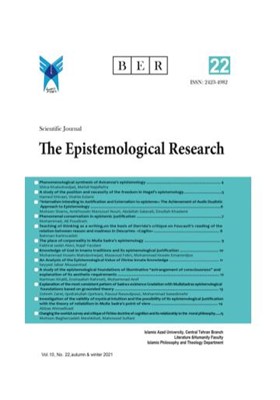Knowledge of God in Imam's traditions and its epistemological justification
Subject Areas : Epistemological researchesMohammad Hosein Mahdavinejad 1 , Masoud Fekri 2 , Mohammad Hosein Emamijoo 3
1 - Payame Noor University Center Of Advanced Studies Department Of Theology Philosophy Of Religion Group
2 - Associate Professor of Tehran University
3 - مربی آموزشی دانشگاه قرآن و حدیث
Keywords: Justification, Knowledge of God, Ahl Al-Bayt, primordial nature knowledge, Moderate Foundationalism,
Abstract :
The epistemological explanation of the knowledge of God is certainly one of the most important and controversial in the philosophy of religion. One of the theories presented is primordial nature theology. The Imams (as) in their hadith family have largely spoken on the knowledge of God by primordial nature. The innate knowledge of God in the expression of the Ahl al-Bayt (peace be upon them) is such that God has placed His knowledge in the institution of all human beings and they have no involvement in obtaining this knowledge. In addition, a large group of verses and hadiths have made statements about monotheism that are based solely on narrated sources. The purpose of this research and its innovation is to examine the epistemological validity of propositions related to the knowledge of God based on the Qur'an and the traditions of the Ahl al-Bayt. Accordingly, among the theories of justification, the selected theory of this study is based on the moderate fundamentalism. The method of this article, in terms of theological propositions, is the method of library study (study of documents) and the descriptive-analytical method when the epistemological justification is considered.
ابنشعبه حرانى، حسن بن على.(1363). تحف العقول. محقق و مصحح: علی اکبر غفارى، قم: جامعه مدرسین.
ابنطاووس، على بن موسى.(1409ق). إقبال الأعمال. تهران: دار الکتب الإسلامیة.
ابنمنظور، محمد بن مکرم.(1414ق). لسان العرب. محقق و مصحح: جمال الدین میر دامادى، چاپ سوم، بیروت: دار الفکر للطباعة و النشر و التوزیع، دار صادر.
ربانی گلپایگانی، علی. (1387). «هدایت و معرفت فطری در احادیث». کیهان اندیشه، شماره 84، صص 151-167.
الرضى، محمد بن حسین. (1414ق). نهج البلاغة. محقق و مصحح: صبحی صالح ، قم: هجرت.
صدرالدین شیرازی، محمد بن ابراهیم.(1366). شرح أصول الکافی. تهران: مؤسسه مطالعات و تحقیقات فرهنگى.
صدوق، محمد بن على.(1398ق). التوحید. محقق و مصحح: هاشم حسینى، تعلیقه حسینی طهرانی، قم: جامعه مدرسین.
طریحی، فخر الدین بن محمد.(1375). مجمع البحرین. محقق و مصحح: احمد حسینى اشکورى، چاپ سوم، تهران: مرتضوى.
عیاشى، محمد بن مسعود.(1380ق). تفسیر العیاشی. محقق و مصحح: هاشم رسولى محلاتى، تهران: المطبعة العلمیة.
فیومى، أحمد بن محمد.(1414ق). المصباح المنیر فی غریب الشرح الکبیر. چاپ دوم، قم: موسسه دار الهجرة.
کشفی، عبدالرسول.(1385). «دسته بندی نظریههای توجیه معرفتشناختی». پژوهشنامه فلسفه دین، شماره 8، صص65-88.
کلینى، محمد بن یعقوب بن اسحاق.(1407ق). الکافی. محقق و مصحح علی اکبر غفاری و محمد آخوندی، تهران: دار الکتب الإسلامیة.
مجلسى، محمد باقر.(1403ق). بحار الأنوار. بیروت: دار إحیاء التراث العربی.
مصباح یزدی، محمد تقی.(1361). «معارف قرآن (3)، خداشناسی فطری». رشد معلم، شماره3، صص 12-15.
ملکیان، مصطفی.(1387). «ایمان و تعقل». قم: انتشارات دانشگاه ادیان و مذاهب.
Goldman, Alvin I. (1991), Liaisons: Philosophy Meets the Cognitive and Social Sciences, Cambridge: the mit press.
Harman, Gilbert (1973), Thought, Princeton: Princeton University Press.
Pojman, Louis P. (2000), What Can We Know?: An Introduction to the Theory of Knowledge, second edition, Boston: Cengage Learning.
_||_

